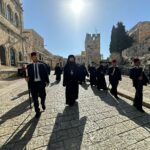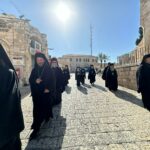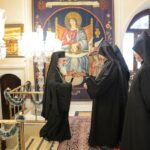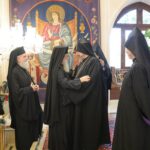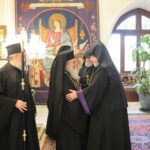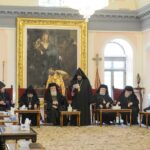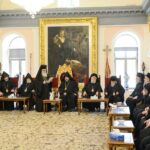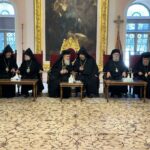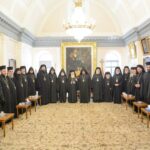On Wednesday, November 9/22, 2023, at 10:30 p.m. The 18th anniversary of the election and enthronement of His Beatitude our Father and Patriarch of Jerusalem Theophilos III was celebrated.
Due to this event, a Doxology was performed in the Catholicon of the Church of the Holy Sepulchre, presided over by H.H.B. with the co-celebration of the High Priests of the Throne, Holy Sepulchre Hieromonks, Elders from the parishes of Israel and from Palestine, Archdeacon Mark and other deacons. The chanting was delivered by Hierodeacon Simeon on the right and Mr Angelos Yiannopoulos on the left, in the presence of the Consul General of Greece in Jerusalem, Mr Dimitrios Angelosopoulos and members of the Greek community.
After the Doxology, the whole congregation went to the Patriarchate Reception Hall, where the Geronda Chief Secretary, His Eminence Archbishop Aristarchos of Constantina addressed His Beatitude as follows:
“Your Beatitude Father and Master,
The city of Gaza is honoured by its mention in the book of the Acts of the Apostles of the early Church. ” A man of Ethiopia, an eunuch of great authority under Candace queen of the Ethiopians” was headed to Gaza, when the Spirit of the Lord informed the apostle Philip to approach his chariot, preach to him and baptize him when they found water (c.f. Acts 8, 27- 39). Subsequently, from AD 306, Gaza and its surroundings were the area of missionary, monastic and social activity of Saint Hilarion the Great, disciple of Saint Anthony. Between the years 395 and 421 AD Saint Porphyrios, who came from Thessalonica to the Holy Land, was ordained bishop of Gaza, and established Christianity in Gaza through many struggles. On these foundations from 743 AD, Cosmas of Jerusalem, the melodist Bishop of Maiuma of Gaza, developed his pastoral work for ten years.
This city, after such a glorious Christian cultural heritage, survived the political conquests and mutations of history, alas! today it is plagued and desolated by hostilities, the consequences of which are the ruins of building complexes, the loss of lives of innocent civilians, women and children, “of which there was no number”, which cause a heart-rending sigh, including the 18 victims of those who took refuge at the holy Monastery of Saint Porphyrios of our Patriarchate.
Under the shadow of these gloomy and tragic events and in a spirit of participation towards the tested people and the Greek-Orthodox Arabic-speaking flock in Gaza, the Patriarchate and the Holy Sepulchre Brotherhood within it is not celebrating solemnly this year. Instead, a special memorial is being made ecclesiastically, through Doxology at the Church of the Holy Sepulchre, for the event of the election and enthronement of Your Holy Beatitude at the glorious Throne of the Mother of Churches, by God’s blessing and the unanimous votes of the Holy Synod, eighteen years ago.
Continuing our ecclesiastical Synaxis in this historic hall of the Patriarchate, we consider it worthy and fair to mention that this honourable but also multi-responsible Patriarchal Pastorate was taken over by His Beatitude with the burden of illegal agreements on His shoulders, from those who promised an incalculable amount of material and cultural value property of the Patriarchate, that is the Imperial and Petra hotels of the Jaffa Gate. For the cancellation of these agreements, Your adamant Beatitude went to court and other battles which demanded huge sums of money.
As one of the priorities of Your Work, Your Beatitude had the preservation of this property under the full ownership management of the Patriarchate, mainly to ensure the always unimpeded access of Christian leaders and pilgrims to the Church of the Holy Sepulchre. You did not neglect the care of the dignity of the Church, through the participation of our Holy Sepulchre Brotherhood in the conservation works carried out along with the Franciscans and the Armenians of the floor of the Rotunda and the area below the Seven Arches and to the south of it. Moreover, the preservation and restoration of the old Russian-made chandeliers by special conservators from Russia, as well as donors, under the direction and cooperation of the icon-conservator from Cyprus Mr Stavrou Andreas. Mr Stavrou continues his conservation work by extension to the antiquities of the Library of the Monastery of the Holy Cross and the lower hall of the Patriarchate and to the icons of the Gallery for the purpose of their appropriate placement in the museum which is being prepared to be housed in the preserved and renovated house of the Blessed Patriarch Diodorus.
It should also be noted that the efforts of Your Beatitude were intense in rallying and mobilizing the Christian Churches of Jerusalem in a common dynamic Christian witness under the leadership of the Patriarchate, to protect the rights of Christians in their native Holy Land from verbal and physical abuse by the radical extreme Israeli elements, one of which happens to be the ongoing occupation of the property of the Patriarchate belonging to the School and the cemetery of Holy Zion.
To the Consuls of other visitors of various countries and those of the European Union who visited the Patriarchate without interruption, you put a great effort into their understanding and consideration of the factor of the religions, Jewish, Christian and Muslim, and their doctrines, as the basis for the solution of the old political Palestinian problem, wherever the status of the Old City of Jerusalem is preserved.
Through Your actions, Your Beatitude, you promoted the Patriarchate to the position it deserved as the most ancient Christian institution of the greatest religious, cultural and pacifying offering and scope and beyond the limits of its jurisdiction in the Holy Land. This is inferred from our visit, beginning last September, to the Exhibition organized in cooperation with the Palestinian Authority, to the Ecumenical Centre of the W.C.C. in Geneva, where you presented the renovated Basilica of the Nativity of Bethlehem last year as the heart and the shield protecting the identity of the Christian and the entire Palestinian people. This is also inferred from our visit to the European Union in Brussels, during which you reiterated the need to protect the rights of the Christians of the Holy Land, not least through your participation as an honoured guest at the coronation of the King of the United Kingdom Charles III with oil consecrated to the Church of the Holy Sepulchre. Also, from our recent visit to Pope Francis in the Vatican, when you once again appealed for the protection of the threatened Christians of the Holy Land and expressed the commitment of our Patriarchate to mediate for a dialogue for the sake of peace between Russia and Ukraine and for the sake of the dialogue of avoiding the consolidation of the schism in the disturbed unity of the Orthodox Churches.
In the dialogue with the other Christian Churches, our Patriarchate also continued to participate in order to approach and present, despite the existing doctrinal differences, a common Christian witness to the world suffering from various problems and asking for comfort. Proof of this is the dialogue hosted by the Anglican Church between the Orthodox and the Anglican Church, which hastily completed its work, due to the onset of the war in Gaza.
It is worth noting that since the start of this disastrous war, Your Beatitude has continuously consulted with the other local Churches for joint calls for a cease-fire and declarations of condemnation of the attacks, from which the innocent victims were numerous. The victims of the Monastery of Saint Porphyrios, for the repose of the souls of whom Your Beatitude held a memorial service in the Church of the Resurrection and the victims of the Gaza Hospital of the Anglican Church in Jerusalem.
The worthily commemorated here today, Your Beatitude, are only a few contributions from the rich Pastoral activity of our Patriarchate and Your inspired guidance and prudent government management for the strengthening and encouragement of us, the Holy Sepulchre Fathers, and the clergy and the people, so that we may continue united with each other and with You in our struggle for the conquest of what is best and perfect for the praise of our blessed race and the glory of our Triune God.
Raising the glass, Your Beatitude, on behalf of the Brotherhood and the Holy Synod, I wish You many returns in good health, unbroken and stable, undisturbed, so that you may rejoice and be glad when you see the Church of Zion, the Throne of which God bestowed upon You, heading from success to success, from progress to progress and from glory to glory. So be it.”
The Consul General Mr Dimitrios Angelosopoulos addressed His Beatitude as follows:
“Your Beatitude,
I have the special honour to express to You the warmest congratulations of the Hellenic Republic and mine personally on the 18th anniversary of your enthronement. My colleagues and I are happy to celebrate this glorious anniversary together with the Patriarchate, the Holy Sepulchre Brotherhood and your Flock, filled with profound respect for Your Beatitude and gratitude for Your struggle and the precious work You are doing, since the blessed day on which You ascended the holy Throne of the Patriarchate of Jerusalem.
No one forgets that You took on this task under conditions that were among the most demanding and dangerous in the modern history of the Patriarchate of Jerusalem. But the Church always finds the strength and wisdom to face even the most serious crises. In the long and arduous journey since then, You and the Holy Sepulchre Brotherhood have restored and strengthened the prestige and radiance of the Patriarchate, for the benefit not only of its high spiritual and pastoral work but also of the safeguarding of its rights, the protection of holy places in the Holy Land and of its highest mission, the guardianship of its two-thousand-year tradition in the Holy Land.
Moreover, under your enlightened leadership, the Patriarchate of Jerusalem is not only an example of ardent adherence to the guardianship of its tradition and the Orthodox Faith but also a guide on the path of moderation and dialogue. In times of constant challenges, heightened international rivalry and intolerance, you have contributed the most with your guidance, with patience and brotherly love, so as to establish admirable unity and understanding among the Christian Churches in the Holy Land. An example of global reach, but also a necessary condition for saving the Christian heritage and presence in the Holy Land.
There is no lack of challenges today and perhaps there won’t be any in the foreseeable future. Jerusalem, the Holy Places and the wider region are once again at the centre of a profound crisis, which has turned into a war. Against the pain and misery that provoke irrational and violent politics, national and religious upheavals, the Patriarchate, under your leadership, provides spiritual consolation, but also is an active and unwavering factor of stability and settlement. Above all, it is a reference point for noble moral and spiritual values, keeping unquenchable the hope that your trying flock, but also all the troubled Humanity, need.
As you know, I was called upon to take up my duties just three weeks before the outbreak of the present crisis. I am sincerely grateful to You for your undivided cooperation, but also for the wise advice you have generously provided me, valuable aids in my own mission.
Your Beatitude,
Greece surrounds you and the Holy Sepulchre Brotherhood with sincere and profound respect, fully aware of your arduous mission. I have the honour to renew today on its behalf its assurances that it remains committed to its will to come as a helper and supporter of the Patriarchate of Jerusalem. For the Hellenic Republic, the defence of the rights and privileges of the Patriarchate in the Holy Land, the strengthening of the guardianship of the Orthodox tradition and the safeguarding of the Christian heritage and presence, are imperatives of the utmost importance. Which concerns the whole of Hellenism, inside and outside the Greek borders, its historical path and its spiritual identity. Therefore, and its future.
On behalf of the Hellenic Republic and the members of the Consulate General, I offer You our warmest wishes for many and happy returns on the Patriarchal Throne of Jerusalem, health and continued success in Your high mission.”
His Beatitude thanked all of them with the following reply:
“The Lord is good to all: and his tender mercies are over all his works” the Psalmist exclaims, (Ps. 144,9).
Your Excellency Consul General of Greece Mr Dimitrios Angelesopoulos,
Dear Holy Fathers and Brothers,
Dear Christians,
“My mouth shall speak the praise of the Lord” (Ps. 144,21), as Holy David says, on today’s Eighteenth, the anniversary of the Enthronement of Our Mediocrity on the historical and Apostolic Throne of the holy and righteous James the Brother of God and the first Hierarch of the Holy Church of Jerusalem.
As the apostle Luke says: “The Holy Ghost hath made you overseers, to feed the church of God, which he hath purchased with his own blood” (Acts 20,28). This Holy Spirit made the righteous James the Brother of God, shepherd and “bishop of God” (Titus 1,7), “A minister of the sanctuary, and of the true tabernacle, which the Lord pitched, and not man” (Heb. 8, 2).
We say this because the solemn anniversary of this enthronement does not relate to Our Mediocrity, but to the sacred institution of the Church, of which Christ is the head, and He is the Saviour of her body (cf. Eph. 5,23) according to Saint Paul.
Because we too, being grateful for the Lord’s favours, went after the accompanying honourable members of our Venerable Holy Sepulchre Brotherhood to the Church of the Holy Sepulchre, we rendered a thanksgiving praise to the Holy Triune God ” who alone doeth great wonders: for his mercy endureth forever” (Ps. 135,4).
Recalling the words of Saint Peter: “Feed the flock of God which is among you, taking the oversight thereof, not by constraint, but willingly; not for filthy lucre, but of a ready mind; Neither as being lords over God’s heritage, but being examples to the flock” (1 Pet. 5, 2-3), we have not diminished the daily care of the Christians and of the pious flock of the Rum Orthodox Communities serving under the spiritual and ecclesiastical jurisdiction our Patriarchate, saying supplications and prayers of thanksgiving for all people, as the Lord will have all men to be saved, and to come unto the knowledge of the truth (cf. 1 Tim. 2,1-4).
Moreover, we did not give sleep to Our eyes and eyelids (cf. Psalm 131,4) in order to preserve the Holy Shrines which are the visible and true witness of the iconographic history in general and of the great mystery of piety (1 Tim. 3,1-6) more specifically, but also of the holy places of logical worship as well as the defence of the indescribable privileges and sovereign rights of the pious and noble race and nation of the Rum Orthodox Christians.
Even so, following the words of the Prophet Isaiah: “For Zion’s sake will I not hold my peace, and for Jerusalem’s sake I will not rest” (Is. 62,1), we did not stop protesting and denouncing every political and diplomatic authority, locally and internationally, the subjugated alteration of the existing poly- religious and multinational character of the holy city of Jerusalem, on the one hand, and the characterization invented by the Civic Authorities and related factors, ab-antiquo recognized ecclesiastical properties and pilgrimage lands, as public gardens (National Parks), on the other. Let it be noted that for this we have the Primates and the other Christian Communities in the Holy Land as -companions.
On the other hand, with agony and deep sadness we are watching the indescribable dramatic developments of the ongoing military conflict in the Gaza Strip, the loss of innocent human lives regardless of age, as well as the precarious situation of those taking refuge in the Holy Monastery of Saint Porphyrios of Gaza for protection, as well as of our Holy Sepulchre brothers, His Eminence Archbishop Alexios of Tiberias, our Patriarchal Representative, and the Hieromonk Silas, who is the ministering Priest there, who serve our Christian flock with self-denial. “I am the good shepherd. The good shepherd lays down his soul for the sheep” (John 10,11), says the Lord.
Our Venerable Holy Sepulchre Brotherhood and Our Mediocrity, being faithful to our spiritual and ecclesiastical mission, which was bestowed upon us by the Divine Providence, and hearing the Chief of the Apostles Peter’s advice, “brethren, give diligence to make your calling and election sure: for if ye do these things, ye shall never fall” (2 Peter 1,10), have unceasingly tried to recompense to no man evil for evil, to live peaceably with all men (c.f. Romans 12,17-18). We put in action the good tidings of love, peace and righteousness of Christ. “For the kingdom of God is not meat and drink; but righteousness, and peace, and joy in the Holy Ghost” (Romans 14,17), Saint Paul preaches.
The eighteen-year enthronement anniversary of Our Mediocrity, celebrated today, relates mainly and primarily to the God-ordained institution of the Church of Jerusalem, founded on the redeeming blood of our Saviour Christ. For He tells us all that “the gates of heaven shall not prevail against it” (Mt. 16:18) and “that God is indeed among us” (1 Cor. 14:25). This does not mean that the purpose of the holy Church of God is the building up in Christ and the salvation of our souls. “Beloved, when I gave all diligence to write unto you of the common salvation, it was needful for me to write unto you, and exhort you that ye should earnestly contend for the faith which was once delivered unto the saints” (Jud. 1:3), the Apostle Jude orders.
We say this because the mission of the Christian in our contemporary world, when “the whole world lies in wickedness” (1 Jn. 5:19) and is under the bondage of sin, is the testimony of our faith in Christ “unto the world, to bear witness to the truth” (John 18:37). This is exactly the truth of Christ, which we were called to bear witness to. “Do not receive a spirit of slavery, but receive a spirit of adoption” (Rom. 8,15) and “with freedom, Christ has set us free” (Gal. 5,1) the wise Paul preaches. The testimony of the truth of Christ is denounced throughout the world by the holy Church of Jerusalem from the place of the “Martyrdom” that is Golgotha as well as the “Empty Tomb” of our Risen Saviour Christ.
We, the successors of the apostolic office of Saint James the Brother of God, and as Saint Hippolytus says, “appointed guardians of the Church”, are not alone in our Patriarchal, ecumenical and pastoral ministry, because we have as communicants and meet comforters the respected and beloved in Christ, Holy Sepulchre Fathers and brothers High Priests, priests, hieromonks, deacons and monks distinguished by the moral and sacrificial and philanthropic spirit of the Church. “Let us all love one another in unity; and I shall not see my neighbour according to the flesh, but in Christ Jesus. Let there not be among you that which may divide you, but be united to the bishop, submitting to God through him in Christ” the hieromartyr Ignatius of Antioch orders.
This enthronement anniversary of Our Mediocrity calls us all to the unity of faith and the communion of the Holy Spirit, especially with the brotherly Orthodox Churches. “Unity is achieved through love and truth and a preference for good”, the great Origen points out. This “good choice” was shown very recently by the sister and neighbour Holy Church of Antioch, which restored the Eucharistic Communion with us. Let the love in Christ do this for the imitation of the brothers of the Orthodox Churches who are in misunderstanding and division.
For we too are in ministry to the saints, that is, to Christians as well as to the holy places of the Nativity, Crucifixion and Resurrection of God and our Saviour Christ, ordering ourselves “in all things grieving but not distressed” (2 Cor. 4,8 ) we continually thank and pray to God, that He may pacify our region, tested by the fire of the enemy, and preserve, in the hearts of the Primates of the brother Churches, the unity of the Spirit in the bond of peace (cf. Eph. 4,3).
Let us ask the Lord to direct our hearts “to the love of God and to the patience of Christ” (2 Thess. 3,5), through the intercessions of our Most Blessed Lady Theotokos Mary and the prayers of our holy Father Nektarios, Bishop of Pentapolis. May the Grace of the Holy and Life-giving Tomb strengthen and protect us all in everything and always, especially during these difficult days.
Therefore, we call upon, on all those praying with Us and honouring through their presence the enthronement on this feast of Ours, for power from on high, the illuminating energy of the Holy Sepulchre, and every blessing from God, expressing warm thanksgiving to those who addressed Us: His Eminence Archbishop Aristarchos of Constantina and Chief-Secretary, who spoke on behalf of the respected members of the Holy Synod and of the Holy Sepulchre Brotherhood, His Excellency the Consul General of Greece in Jerusalem Mr Dimitrios Angelosopoulos, the representative of the Holy Church of Russia, Reverend Archimandrite Vassianos, who conveyed the wishes of His Beatitude the Patriarch of Moscow Cyril, the representative of the Holy Church of Romania, Reverend Archimandrite Theophilos, who conveyed the wishes of His Beatitude the Patriarch of Romania Daniel, His Eminence Metropolitan Kyriakos of Nazareth, who spoke on behalf of our flock in Nazareth, His Eminence Archbishop Damascene of Yaffo, who spoke on behalf of our flock in Yaffo, Reverend Fr Charalambos Badour, who spoke on behalf of Saint James Cathedral, the representatives of our Russian-speaking flock Fr Nikolaos Koulinsky, Fr Alexander from the Beer Sheba community, Fr Stavros Aranki who spoke on behalf of Birzeit community, the Ambassador of Russia to Israel Mr Victorov, the Ambassador of Georgia to Israel Mr Lasha, Mr Ode Quas, who spoke on behalf of the Schools of the Patriarchate and Mrs Panayiota Kafetzi, who spoke on behalf of the School of Saint Dimitrios, as well as all others who have participated in this celebration of the Enthronement Anniversary.
The reception was followed by a meal for the Holy Sepulchre Brotherhood at the Patriarchate’s refectory.
From Secretariat-General
